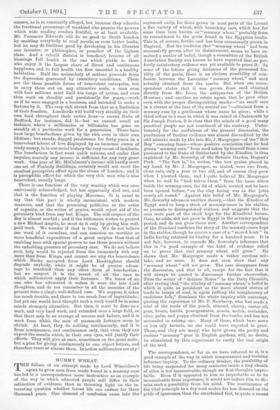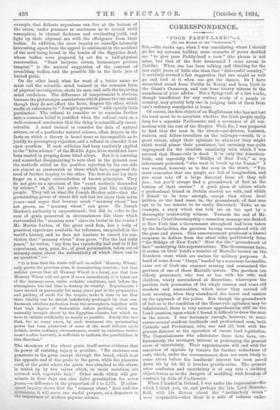MUMMY WHEAT.
THE failure of an attempt made by Lord Winchileea's agent to grow corn from seeds found in a mummy-case has led to a correspondence more instructive as an example of the way in which educated people still differ in their estimation of evidence, than in throwing light on the in- teresting question whether latent life can endure for three thousand years. One element of confusion came into the argument early, for there grows in most parts of the Levant a fine variety of wheat, with branching ears, which has for some time been known as "mummy wheat," probably from its resemblance to the grain found in the Egyptian tombs. This is, of course, fertile, and has been occasionally grown in England. But the tradition that "mummy wheat "had been successfully grown, after its disinterment, seems to have re- mained a matter of belief, though a committee of the British Association Society was known to have reported that no per- fectly satisfactory evidence was yet available to prove it. In some of the letters giving instances of the presumed fer- tility of the grain, there is an obvious possibility of con- fusion between the Levantine "mummy wheat," and seed actually obtained from the tombs. But when one corre; spondent states that it was grown from seed obtained directly from Mr. Lane, the antiquarian of the British Museum ; and another, an estate agent, that he grew other corn with the proper distinguishing marks—" six small ears in a cluster at the base of the central ear "—obtained from a mummy-case by a gentleman whose name he gives ; while a third refers to a case in which it was raised at Chatsworth by Sir Joseph Paxton, it is clear that the minds of a good many practical people are not convinced of the contrary. Unfor- tunately for the usefulness of the present discussion, the production of farther evidence was almost discredited by the odd mistake made by the late Mr. J. Macgregor—of the " Rob Roy" canoeing fame—whose positive conviction that he had grown" mummy corn " from seed taken by himself from a case presented to the Dake of Sutherland by the Khedive, is thus explained by Mr. Sowerby, of the Botanic Garden, Regent's Park. "The fact is," he writes, the two grains placed in my hand by Mr. J. Macgregor, as stated, were two fresh, clean oats, only a year or two old, and of course they grew when I planted them ; and I quite believed Mr. Macgregor when he said he "had taken them" from the loose debris inside the mummy-case, the lid of which seemed not to have been opened before, " as the clay luting was in the joint nearly all round." Against this belief of Mr. Macgregor's, Mr. Sowerby advances another theory,—that the Khedive of Egypt used to keep a stock of mummy-cases in his stables, as presents to distinguished visitors, and suggests that the oats were part of the stock kept for the Kbedivial horses. Oats, he adds, did not grow in Egypt in the mummy-packing period, and do not grow there now. Another correspondent of the Standard confirms the story of the mummy-cases kept in the stables, though he quotes a case of a "sacred bean" in India having retained its vitality for a hundred years. It is not fair, however, to concede Mr. Sowerby's inference that this is "a good example of the kind of evidence relied on to prove that real mummy wheat will grow." He shows that Mr. Macgregor made a rather careless mita take, and no more. It does not even show that any "mummy wheat" will not grow. The case disappears from the discussion, and that is all, except for the fact that it will always be quoted to discourage further observation. Thus the writer of "Science Notes" in the Daily Chronicle, after stating that " the vitality of mummy wheat,' a belief in which is quite as persistent as the more absurd stories of toads in lumps of coal, is again ruffling the complacency of credulous folk," dismisses the whole inquiry with contempt, quoting the experience of Mr. P. Newberry, who has made a trial of the seeds of the peach, almond, cherry, castor oil, peas, beans, lentils, pomegranates, acacia, melon, coriander, olive, palm, and poppy obtained from the tombs, and has not succeeded in raising one. Many of these, which have more or less oily kernels, no one could have expected to grow. Those, and they are many, who have grown the pretty and curious "mummy" peas in English gardens, will, no doubt, be stimulated by this experiment to verify the real origin of the seed.
The correspondence, so far as we have referred to it, is a good example of the way in which temperament and training influence inquiry. To the ordinary thinker, the possibility of life being suspended for many centuries inside a tiny sheath of silica is not inconceivable, though on first thoughts impro- bable. Even if it appeared to him so improbable as to be inconceivable from experience, it would not induce him to die- miss such a possibility from his mind. The continuance of the vital principle in a dry seed makes far less demand on the pride of ignorance, than the ascertained fact, to quote a recent example, that delicate organisms can live at the bottom of the ocean, under pressure so enormous as to exceed vivid conception, in eternal darkness and everlasting [cold, and light up their abysmal sea with the effulgence from their bodies. In addition, the mere inquiry so raisedlis intensely interesting, apart from the appeal to sentiment in the accident of the seed being found in the tombs of the Egyptian dead, whose bodies were prepared by art for a half-physical resurrection. " Stint lacrymm rerum, humanaque pectora tangunt " is the natural suggestion of the contrast of crumbling bodies, and the possible life in the little jars of buried grain.
On the other hand, what for want of a better name we must call the scientific mind, trained in the common form of physical investigation, shuts its ears, and calls the inquiring mind credulous. The difference of temperament is obvious, because the picturesque associations which please the one mind, though they do not affect the facts, disgust the other, which scoffs at references to " Joseph's granaries " with equally little pertinence. The refusal to consider or to examine further into a common belief is justified when the refusal rests on a well-reasoned conclusion that the thing is scientifically incon- ceivable. A mind trained to consider the data of natural science, or of a particular natural science, often detects in the facts on which a theory is based some so incompatible as to justify its peremptory rejection, and a refusal to consider it an open question. If such criticism had been resolutely applied to the "false science" of the Middle Ages, lives would not have been wasted in groping down blind alleys. But it is amusing and somewhat disappointing to note that in the present case the methods relied on for positive rejection by the one side are almost as amateurish as those which have suggested the need of further inquiry to the other. The first do not lay their finger on a single contradiction of known principles. They do not give us a specimen of the "exact methods demanded
by science" at all, but quote opinion just like ordinary people. They tell us what Sir Joseph Hooker said—that the germinating power of wheat did not last for more than seven
years—and argue that because much " mummy wheat " has not grown, no "mummy wheat" can grow. Sir Joseph Hooker's authority is unquestioned; but did he refer to the case of grain preserved in circumstances like those which surrounded the "mummy corn" since its burial in the tombs Mr. Martin Sutton, of the great seed firm, has a body of practical experience available for reference, unequalled in the world's history, and he does not hesitate to record his con- viction that " mummy wheat" does grow. "For the last sixty years," he writes, " my firm has repeatedly had sent to it for experiment, corn, peas, &ea of good germination, taken out of mummy-oases, about the authenticity of which there can be no question " "It is true that the Arabs will sell so-called 'Mummy Wheat,' only grown the previous year to unsuspecting tourists ; but that
neither proves that all Mummy Wheat is a fraud, nor that true
Mummy Wheat will not grow if sown immediately it is taken out of the mummy-cases, under suitable conditions, and before the
atmosphere has bad time to destroy its vitality. Experiments I have carried on personally for many years past in the preparation and packing of seeds for the tropics, make it clear to me that their vitality can be almost indefinitely prolonged by close con-
finement, absolute protection from the atmosphere, together with that high degree of desiccation before packing, which was
naturally brought about by the Egyptian climate, but which we have to imitate artificially as nearly as possible. Surely the fact that, for so many years, by such treatment the germinating
power has been preserved of some of the most delicate seeds (which, under ordinary circumstances, would be valueless twelve month s after harvest), is sufficient to indicate the possibilities in this direction."
The structure of the wheat grain itself seems evidence that its power of resisting injury is peculiar. "No moisture can penetrate to the germ except through the beard, which is at the opposite end of the grain to the germ, while the placenta cord, at the point where the grain was attached to the straw, is sealed up by two valves which, to resist moisture, are covered with vegetable hair." Other seeds which will ger- minate in four days can also defer germination for seven years,—a difference in the proportion of 4 to 2,575. If subse- quent inquiry shows that the "mummy wheat" does and can germinate, it will serve one useful purpose, as a demurrer to the impatience of modern popular science.







































 Previous page
Previous page